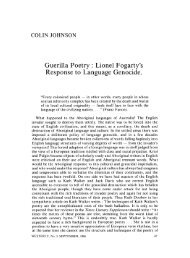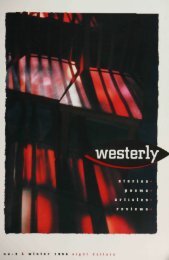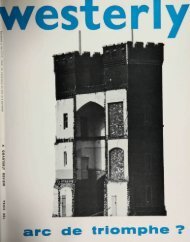In the back room Esson could feel the elbows of his neighbours easing againsthim with their breathing. At his feet he could feel, on his ankle, the hot breath ofa large dog. He moved his foot and the dog snarled."Is there anyone here boy?" asked the policeman."No sir," said the boy in a voice he'd used for his first confession."You have a lot of lamps shining for nothing.""We were just cleaning up, sir. My sister and me.""And where are your parents?""Out sir.""So there's only you and your sister?""Yes sir.""Alright lad," he said, looking around the room. "If anyone comes by, tell themyou're closed.""Yes sir.""Good night boy.""Good night sir."And the policeman left. The kid waited until he heard the last of his boots inthe street then, picking up a lamp, he walked to the back room and flung openthe door."Come on now! Out you come the lot of you," he shouted."First orders!"The next night Esson was back in Dublin and looking for the Abbey Theatre,which was difficult to find. When he finally asked someone in the street, Essondiscovered that he too was going to the theatre so they went together. At the boxoffice, Esson saw that his new companion could afford only the cheapest seat. Hefelt a kind of companionable loyalty to his guide and so bought a cheap seat too.He left a card with the door keeper to tell Yeats that he was in the house so when,half way through the play, he saw a tall silhouette raking the front stalls, his attentionto the play faltered and he longed to cry out: "I'm up here, sir. Up here!"The play was The King's Threshold which had been first performed a couple ofyears earlier in a hall normally given over to Protestant missionary fund raising byday, and badminton by night.In spite of being sought by the author throughout the production, Esson enjoyedThe King's Threshold, which was like a series of dramatic slides where a court poetgoes on a fast when the king banishes both poet and poetry from the royal table.The thing that struck Esson was the style of acting. Actors did not speak when theymoved; no one moved while someone else was speaking. It went against the fluidcharm of the London stage where the eye was drawn into the action like a windamong leaves. Here it was static; also curiously compelling.Soldier, courtier and priest all urged the poet to eat, all in vain:You have rightly named me.I lie rolled up under the ragged thornsThat are upon the edge of those great watersWhere all things vanish away, and I have heardMurmurs that are the ending of all sound.I am out of life; I am rolled up, and yet,Hedgehog although I am, I'll not untilFor you, King's dog!44WESTERLY, No.2, JUNE, 1989
Esson listening to these actors, who were so cautious about moving, experiencedthe same sensation as an English critic who had earlier remarked that "We arelistening to English spoken with watchful care and slightly timorous hesitation, asthough it were a learned language." Sometimes singing, sometimes chanting, Essonthought: never whining.Watching these actors - amateurs! - he remembered that their style simplyrevealed they were untrained.Yeats had written that this style might have come from the French theatres whereactors like Bernhardt and De Max could hold an audience in thrall and do absolutelynothing."I once," said Yeats, "counted twenty-seven quite slowly before anybody on a fairlywell filled staged moved, as it seemed, so much as an eyelash.""Of course," he added, "our amateurs were poor and crude beside those greatactors, but they followed them as well as they could and got an audience of artisans,for the most part, to admire them."The learning amateurs, "poor and crude", were William and Frank Fay. Theformer, an electrician by trade, who had travelled about Ireland as an advance manwith a circus, said that his actors were quiet and natural not because they had seenSarah Bernhardt or Edouard De Max, but because they did not know what to do.They had not learned to go wrong.And while Esson, when the curtain fell on The King's Threshold, had marvelledat the highly charged declamatory style and the artistry of the piece he was puzzledby the poor house.He wondered if perhaps Dubliners had as little interest in the protocol of a poet'splace at the king's table as people might in Melbourne. Esson went to the Abbeyevery night he was in Dublin and every day too to attend rehearsals for new plays.Now, fifteen years later, as he got off the train at Oxford, he saw along the platformthe tall figure of the great man. Older yes, his hair now an iron grey but with thepince-nez on his nose and his welcoming hand. The same warm and courteous man.After a formal greeting, Yeats led Esson to a cab, and directed the driver to takethem to Broad Street. The Australian noticed Yeats was carrying a book."What are you reading?" he asked.Yeats showed him the cover: Rustler's Roost by Zane Grey."Do you read this stuff, Esson?""Well-er -""Oh you should! Essential for train journeys."They said nothing the rest of the ride.After he had opened the front door and waved him in, Yeats whispered to him"You are not the only one to have married since we last met, nor is your wife theonly who is pregnant."A good looking woman came into the hall. Red-brown hair; a fine smile; aboutthirty."Mr Esson. How do you do?" And English.Over dinner, they recalled their first meeting all those years ago."You were there at a golden time Esson," said Yeats. "Those first ten years ofthis century were not only our best years, but there has never been a more brilliantdecade in the cultural life of Ireland in all its history.""Were you in Dublin for The Playboy, Mr Esson?""Needless to say," said Yeats, "We were denounced not only in Dublin but inLondon too and later in America."too and later in America.""That's not so surely."WESTERLY, No.2, JUNE, 1989 45
- Page 3 and 4: CONTENTSWESTERLYVOLUME 34, No.2, JU
- Page 5: WESTERLYa quarterly reviewISSN 0043
- Page 8 and 9: JAN KEMPTo My Father, M.H.K.My fath
- Page 10 and 11: JAN KEMPThe GypsySuddenly before yo
- Page 12 and 13: WONG PHUI NAMA Death in the WardThe
- Page 14 and 15: WONG PHUI NAMCousinI had to call to
- Page 16 and 17: WONG PHUI NAMObitIt is as thin smok
- Page 18 and 19: So thus I lie here fearful of movem
- Page 20 and 21: VIRGINIA BERNARDA ValedictionWhen N
- Page 22 and 23: "Yeah, yeah," I call, returning the
- Page 24 and 25: she flops for a bit, slurps her tea
- Page 26 and 27: well her students did, she was neve
- Page 28 and 29: English or Indian, that they had th
- Page 30 and 31: ANDREW TAYLORSpringSpring is a dive
- Page 32 and 33: CAROL SElTZERAiming for the MouthTr
- Page 34 and 35: GRAEME WILSONA Selection of Japanes
- Page 36 and 37: a highly ambivalent attitude to his
- Page 38 and 39: Esson attended some rehearsals of T
- Page 40 and 41: the literary life of Bloomsbury. Lo
- Page 42 and 43: Without Yeats Esson would quite lik
- Page 44 and 45: "What theatre do you have in Austra
- Page 48 and 49: "When we started our little theatre
- Page 50 and 51: a screen against a wall. A theatre
- Page 52 and 53: VINCENT O'SULLIVANSinging Mastery:
- Page 54 and 55: flighty relation in most statements
- Page 56 and 57: living and the dead; that places hi
- Page 58 and 59: quite diverse traditions towards th
- Page 60 and 61: WARRICK WYNNEThe Wetlands (for Liam
- Page 62 and 63: JAN OWENSmileOur mother aimed the b
- Page 64 and 65: RICHARD KELLY TIPPINGOlympic Airway
- Page 66 and 67: DAVID REITERBear by the Jasper Road
- Page 68 and 69: (At twenty eight you did not bother
- Page 70 and 71: left, would have risen and walked o
- Page 72 and 73: He had hair like mine used to be, t
- Page 74 and 75: OLIVE PELLThe QuestionTell me how t
- Page 76 and 77: BRIAN MOONANAT 515: MASS LECTURE Th
- Page 78 and 79: PETER KIRKPATRICKTear HereThe bay i
- Page 80 and 81: JOHN WINTERThe Bird ManIn wooded, p
- Page 82 and 83: KNUTE SKINNERAugust 15There's a lig
- Page 84 and 85: M.E. PATTI WALKERThe Hook"Aren't yo
- Page 86 and 87: QMNQMNQMNQMNapartheid man, this is
- Page 88 and 89: QMNQMNQMNeasy because you don't bel
- Page 90 and 91: lands or which have been taken over
- Page 92 and 93: GEOFF GOODFELLOWToo MuchDianne is 1
- Page 94 and 95: SHANE McCAULEYSouth Fremantle, Summ
- Page 96 and 97:
JEAN KENTWaiting Out the DroughtWai
- Page 98 and 99:
STEPHEN MAGEEJesus Falls, South Aus
- Page 100 and 101:
SIMON BROWNBlue Hole, Santothe colo
- Page 102 and 103:
CONAL FITZPATRICKA Brown Dog, Off A
- Page 104 and 105:
PAUL HETHERINGTONOne RoomIn teeming
- Page 106 and 107:
society, or, in the terms of the my
- Page 108 and 109:
emphasised (I think) in the referen
- Page 110 and 111:
Summer Leaves". This continues the
- Page 112 and 113:
Deficiency Bill in Western Australi
- Page 114 and 115:
invocation of pastoral near the beg
- Page 116 and 117:
particularly dreaded). The final re
- Page 118 and 119:
VINCENT O'SULLIVAN - is one of New







